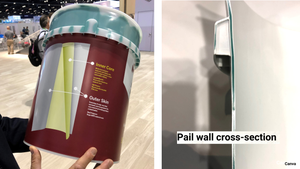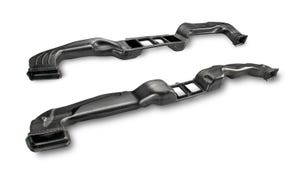Technical developments drive PIM industry growth
November 24, 1999
Powder injection molding is an exciting technology ripe for growth, according to Mike Zedalis of AlliedSignal PowderFlo Technologies, a feedstock and parts supplier. “Some of the only obstacles to expansion are a lack of capable PIM molders and limitations associated with traditional PIM binder systems,” he says. “In essence, there is more demand for PIM parts than the current infrastructure can supply, and existing binder systems limit applications to small, thin parts.” PowderFlo hopes to change that situation with a new water-based binder system and a strong program of tech-nical support aimed at increasing the manufacturing base.
Rather than selling its feedstocks as a commodity resin product, PowderFlo licenses the material and processing technology exclusively to fabricators that it has previously qualified. “This approach allows us to maximize the value of our technology, while providing technical support in a focused fashion,” explains Zedalis. “We license PowderFlo only to fabricators who have the appropriate skills, a strong market presence, and a vision for growth, and then we offer them the technical support they need to be successful.”
Zedalis believes the most fertile ground for developing new PIM molders is in the plastics injection molding industry, because plastics molders already have a technical infrastructure directly applicable to PIM manufacturing. “Any plastics molder can take this material and mold product within half an hour,” he says. “Traditional tooling design and molding skills apply. Where they typically stumble is with sintering, and that’s where we can help.”
Binding with Sugar
PowderFlo is a business enterprise of AlliedSignal’s Engineering Plastics division. Its offerings include stainless steels, nickel-based superalloys, and refractory alloys. PowderFlo’s binder system has been applied to various ceramic materials—alumina, zirconia, and silicon carbide—as well as new metal alloy systems for specific applications. Products made with the metal feedstocks exhibit mechanical properties commensurate with investment casting and often approaching those of wrought components, according to Zedalis.
Binder content sets PowderFlo materials apart from other PIM feedstocks. It is based on agar, a complex sugar derived from seaweed. Once combined with hot water, it has the rheology of a thermoplastic—low viscosity at molding temperatures and sharply increasing stiffness as the binder cools and gels in the mold. This gel acts as the glue, and allows for the shaping of fine metal powders into extremely complex shapes.
Once the parts are molded, simple drying and low-temperature debinding can be combined with the sintering cycle. Both environmentally friendly and FDA-approved, the agar system won’t clog furnaces as it burns off.
Unlike conventional feedstocks, the agar-based system is not part-size limited, which broadens PIM applications to include larger metal components currently made by casting, forging, and machining.
PowderFlo materials are molded at lower temperatures (85C) and cavity pressures (450 to 700 psi, depending on part geometry) than most thermoplastics or other PIM systems. Aluminum tooling is therefore possible for medium-volume production, while rapid soft tooling using epoxy or 3D Systems’ Direct Aim tools can handle low volumes.
“RP tooling can now be used to manufacture truly functional prototypes,” Zedalis says, “and also improve the economics of lower-volume manufacturing.” Epoxy tools have successfully run more than 5000 parts; Direct Aim tools can run 500 to 1000 parts, but upper limits are estimated to be much higher. “There is not as much wear,” he says, “because we mold at low pressure and the particles are spherical.” For high-volume production, conventional steel tooling is applicable.
Structural Metal Components
As a division of AlliedSignal Engineering Plastics, PowderFlo offers engineering services, and design and development support on many applications. The company routinely makes use of finite-element analysis (FEA) to determine structural integrity for new applications, Zedalis says. ”In fact, our target markets are structural metal components, not housings, covers, and plenums, but cast, machined, wrought, or forged 3-D parts.”
Besides growing the industry one licensee at a time, PowderFlo is also helping to refine computer-aided tools for PIM. By volunteering as a beta site for true 3-D CAE for PIM software (Moldflow), the company is providing valuable input. “Initially, we had to develop a rheological and physical property database for our feedstocks so that the models were accurate,” Zedalis explains. “Next we validated the software by comparing its predictions with empirical data. Today, we use it in the tooling design phase to eliminate secondary and reiterative work. The next step is to expand our modeling to include sintering.”
Contact information |
You May Also Like


